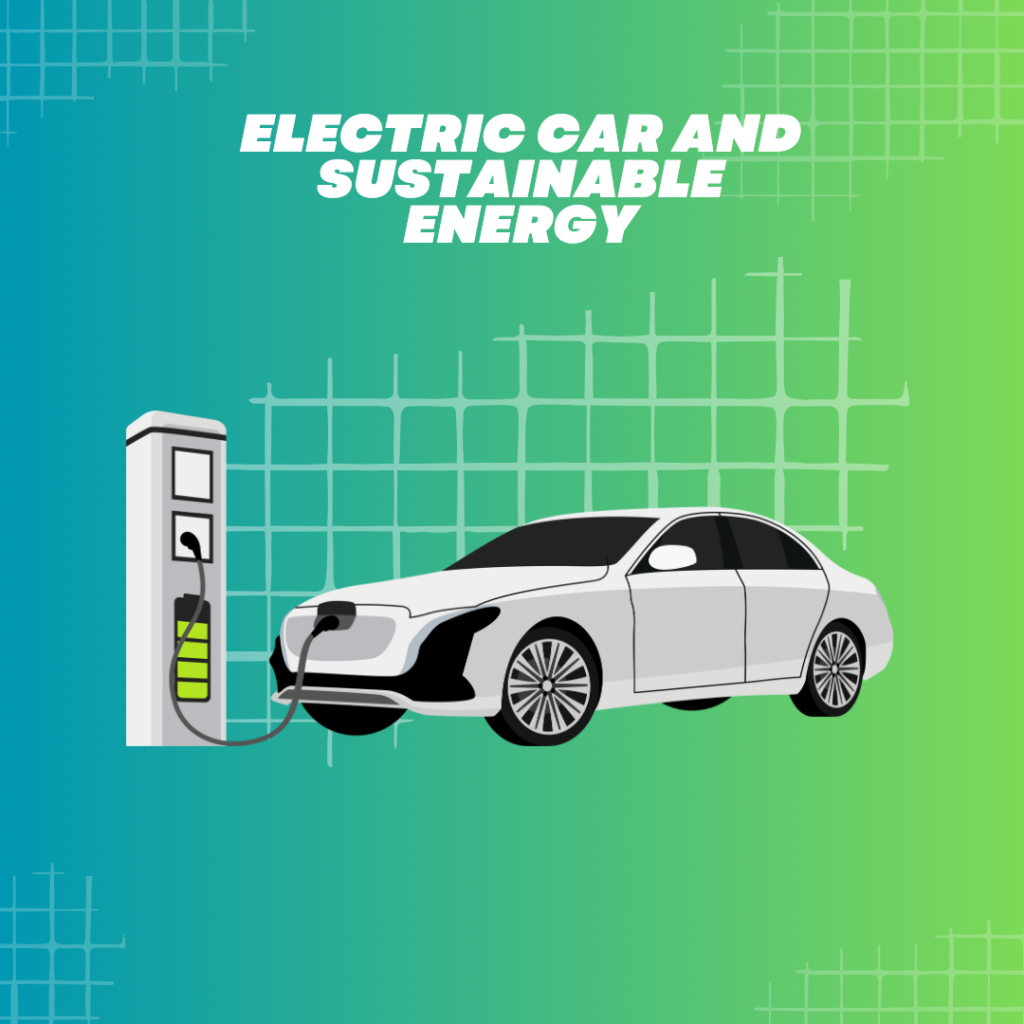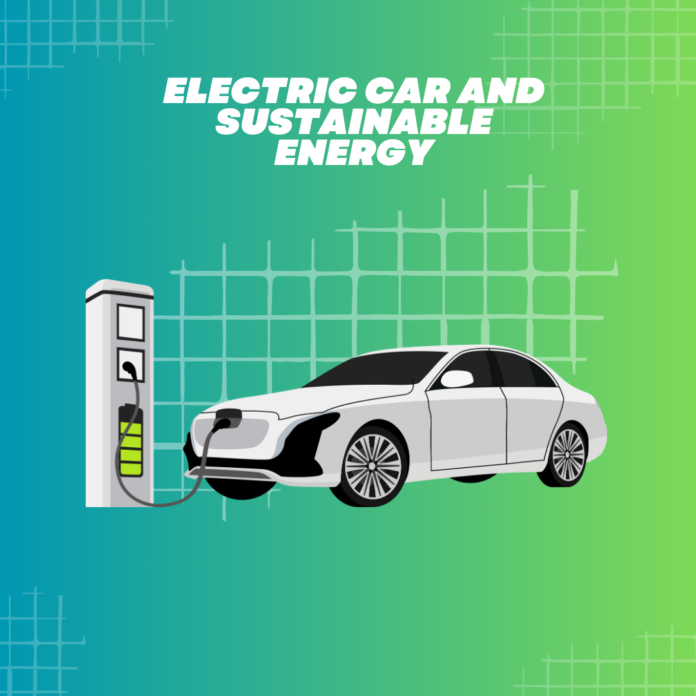Electric vehicles (EVs) and sustainable energy: Shaping Tomorrow’s Greener Roadways
1. Introduce the concept of electric vehicles and their connection to sustainable energy.
2. Why electric vehicles matter in a quest for lower carbon emissions and reduced energy consumption.

3. History of Electric Vehicles and Their Growth.
4. Cultural and social aspects of electric vehicles’ inception.
5. Global increase in the use of electric vehicles.
6. The benefits of Electrical vehicles over conventional gasoline-driven vehicles include efficiency and sustainability.
SUMMARY
EVs and Sustainable Energy: The Perfect Combination
Why solar and wind energy are so crucial in tapping the maximum benefits of electric vehicles.
Role of renewable energy at the charging stations of EVs.
The shift from fossil fuel to renewable energy for the electric vehicle to be fully environment friendly.
Challenges in the Adoption of EVs
Infrastructure limitations related to charging stations and compatibility with the grid.
High fixed cost for consumers before purchase.
Discharge characteristics related to battery technology and energy storage.
Role of Energy in the Future of Electric Vehicles
Introduce emerging concepts or companies about energy, which would go ahead to step up the game in the aspect of improved EV efficiency energy.
How is Energy improving the battery and energy storage aspects to enable a sustainable future?
Technologies for Improved Electric Vehicles
Cutting-edge technologies in electric vehicles: solid-state batteries, autonomous driving, AI integration, etc.
How innovations in making EVs more cost-effective and accessible to people
Future of Electric Vehicles and Sustainable Energy
Predictions and trends for the future of EVs.
How sustainable energy will continue to advance to meet the demands from the rise of electric vehicles.
Global policies and pledges that encourage the rise of electric vehicles and renewable energy.
Environmental Impact and Advantages of Electric Vehicles
How do electric vehicles help save carbon?
How can electric vehicles contribute to our reduction of oil-based products and more?
Conclusion: What is Next on the Road?
Introduction
In the last couple of years, electric vehicles have become one of the most sought-after items in the global quest to take a greener and more sustainable route. As governments and industries go for carbon reduction and fight climate change, electric vehicles emerge as a possible solution that has every virtue of modern automotive technology combined with renewable energy. Let’s, at classiblog.com, take a deep plunge into the electric vehicle future and its implications regarding it being more favorable with solar and wind power sources.
The convergence of electric vehicles and renewable energy connotes much more than technology change; it marks a powerful shift in how we conceptualize transportation and energy consumption. Indeed, fully realizing the potential of electric vehicles necessitates renewable energy sources to power them. Through this cycle of nature, we can speed up the transition to an even greener and more energy-efficient world.
The Rise of Electric Vehicles
Electric cars are not new. Their prospects soon faltered, however, with the subsequent rise of gasoline-powered engines, while fears about pollution and concerns over the finite supply of fossil fuels have renewed interest in EVs.
Even though EVs might still be in the infancy stages of modern usage, they are specifically regarded by many today as the future of transport. Various countries have already formulated policies and incentives to speed up the use of EVs, whereas automotive companies continue to spend significantly on the production of EVs. For example, Tesla, Nissan, and Rivian companies have led this revolution by introducing innovative designs that are not only beautiful but efficient and affordable.
One of the most important advantages of EVs is efficiency. EVs convert between 59% and 62% of the electrical energy drawn from the grid to power the wheels, while traditional gasoline vehicles convert only around 17%-21%. That high difference in energy efficiency directly reduces our dependence on fossil fuels and directly reduces greenhouse gas emissions.
EVs and Sustainable Energy
The Perfect Match One thing electric vehicles alone offer is a huge environmental advantage, but to leverage this potential, they need to be combined with renewable energy sources. If the electricity comes from coal, for instance, or any other fossil fuel, then we’re not quite leveraging the full potential of a more environmentally friendly future.
Some of the best renewable energy sources that would power electric vehicles are solar, wind, and hydropower. In the future, with the integration of even more sustainable energy into our grid, the energy being made completely renewable from power produced by EVs is very possible. Some regions of California as well as parts of Europe are already supplied with solar or wind farms for charging stations for electric vehicles.
The fight against climate change would involve the power of EVs in partnership with renewable energy. If all users of energy for electric vehicles come from renewable sources, then carbon reductions would be incredible. Governments are starting to recognize this opportunity and invest in adding renewable energy infrastructure as electric vehicles are added on.
Challenges in EV Adoption
While there is a lot of hope for the future of electric vehicles and sustainable energy, much heavy lifting remains ahead.
The very first challenge is infrastructure: whereas the number of charging stations is growing with rocket speed, it is still far from being adequate. Rural areas have a very big gap in this regard. Compatibility of the energy grid built-up and the growing demand for EV charging is the other related problem for which major investments have to be made in designing infrastructure for constructing widely available and easily accessible charging stations.
Another hurdle is the high cost, which most consumers are confronted with. Though EVs present a lower total cost of ownership as compared to those running on gasoline, the selling price is the obstacle for most of them. With improvements seen in battery technology, which is still pricey, it could be a limiting factor in cost.
Yet another challenge is the technology itself: producing the battery requires rare earth materials, whose own environmental cost needs to be factored into the equation. Then, of course, there are issues of degradation rate and capacity of energy storage with a battery.
In the Future of Electric Vehicles
It is playing an exciting role in the future of electric vehicles. It is showing a push to the limits of the energy efficiency scale through groundbreaking technology that may revolutionize how EVs store and use energy.
The key shortcomings of current EVs concern battery storage and recharging. Energy aims to supply the missing elements toward the third generation, building a new type of battery that would not only be more energy efficient but much longer lasting and fast charge. With such technologies on the move, there is even greater promise for the future of EVs.
Advancements in EV Technology
Advances in technology are transforming the electric vehicle industry very rapidly. Perhaps the most interesting development is the availability of solid-state batteries, characterized by higher energy densities, much faster charging rates, and a significantly longer lifespan compared with traditional lithium-ion batteries. Such would be crucial for an EV to be practical for long-distance travel.
Autonomous driving technology is also going to revolutionize the EV market. Tesla is already testing its full autonomous capability, which will further reduce the chances of accidents and help regulate traffic flow better. AI-driven EVs will further optimize driving routes and save power, which will boost energy efficiency.
The Future of EVs and Sustainable Energy
The future promises lots of electric vehicles and sustainable energy. In the coming years, we will see a huge adoption of EVs when their prices come down and charging infrastructure is installed. Meanwhile, the renewable energy sector will just continue to grow, trying to make even more clean energy power all these vehicles.
This next wave of innovation will not just come from governments but will be encouraged through the policies implemented by them, such as EV mandates, green subsidies, and increased investment in sustainable energy.
Bright EV future: So, what does a bright electric vehicle future look like? It will look like a cleaner and more sustainable world.
Benefits to the Environment Provided by EVs
One of the largest environmental advantages of EVs is that they promise to save much more greenhouse gas emissions. Because EVs do not produce any tailpipe emissions, they are much cleaner than conventional gasoline- or diesel-powered vehicles.
This will decrease air pollution, reduce reliance on oil, and, overall, retard the rate at which climate change is occurring. But a lot depends on where the source of electricity to power them comes from. The best environmental outcomes for this would be developed if the major sources of electricity used in charging the EV are wind and solar energy.
Conclusion
The transition to renewable energy as well as electric vehicles would pave the way for a greener, cleaner future. More and more people opting for EVs, and hence increasing the share of renewable energy sources, would reduce the carbon footprint as a world and make a healthier planet for coming generations.
Here in classiblog.com at least, we appear to look forward to the electric future and the role that sustainable energy is going to play in its realization. While ahead, of course, the road may have its challenges, only through continued innovation and investment will it be made clear that Electrical vehicles and sustainable energy can change the world.
Frequently asked questions
1. what are electric vehicles?
EVs are vehicles powered by electricity stored in batteries, offering an alternative to traditional gasoline-powered cars.
2. How do EVs contribute to sustainability?
EVs reduce greenhouse gas emissions and air pollution, especially when powered by renewable energy sources like solar and wind.
3. What types of renewable energy can power EVs?
EVs can be powered by electricity generated from solar, wind, hydroelectric, and geothermal energy, reducing dependence on fossil fuels.
4. Can EVs help reduce global carbon emissions?
Yes, widespread EV adoption, combined with clean energy, can significantly reduce global carbon emissions and combat climate change.
5. How does the EV battery impact the environment?
While EV batteries require mining for materials, they have a lower lifetime environmental impact than gas vehicles. Recycling efforts for EV batteries are also improving.

